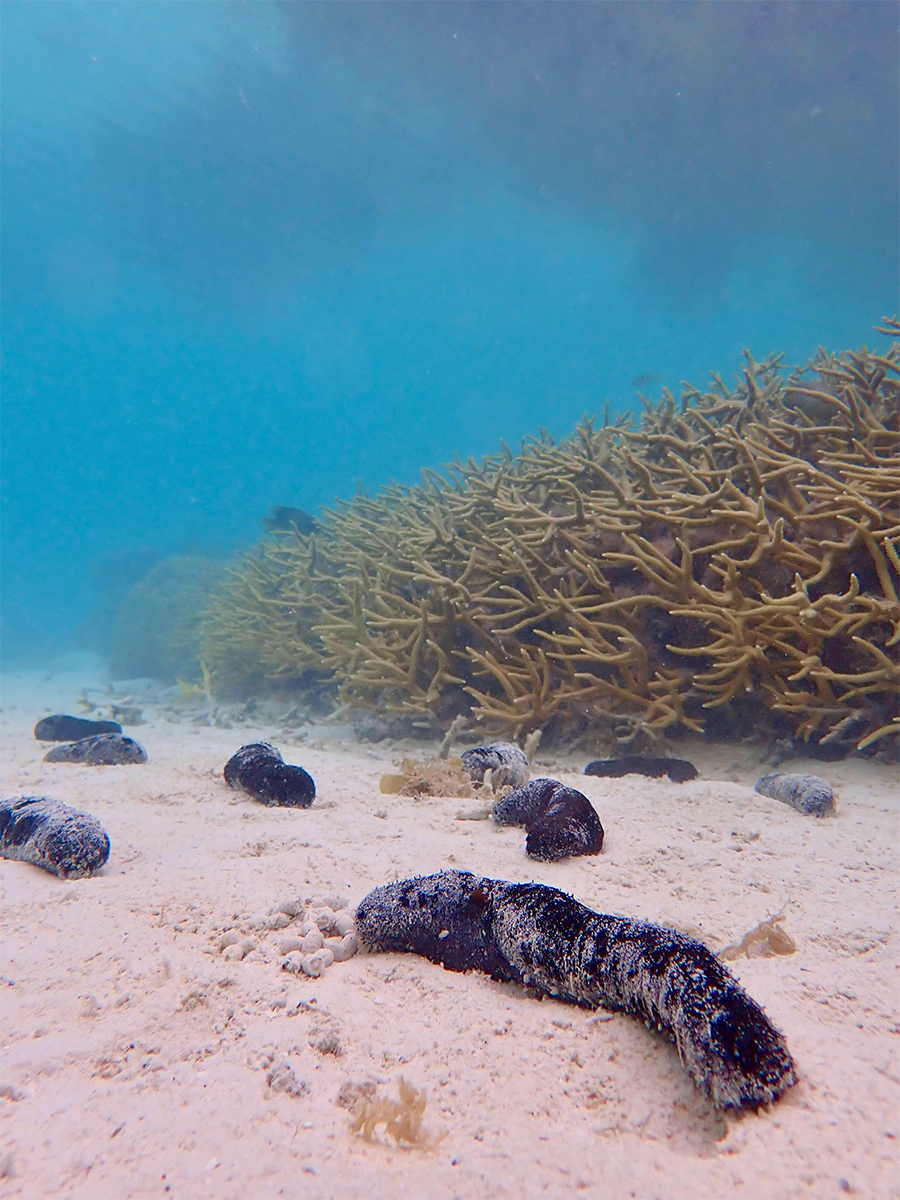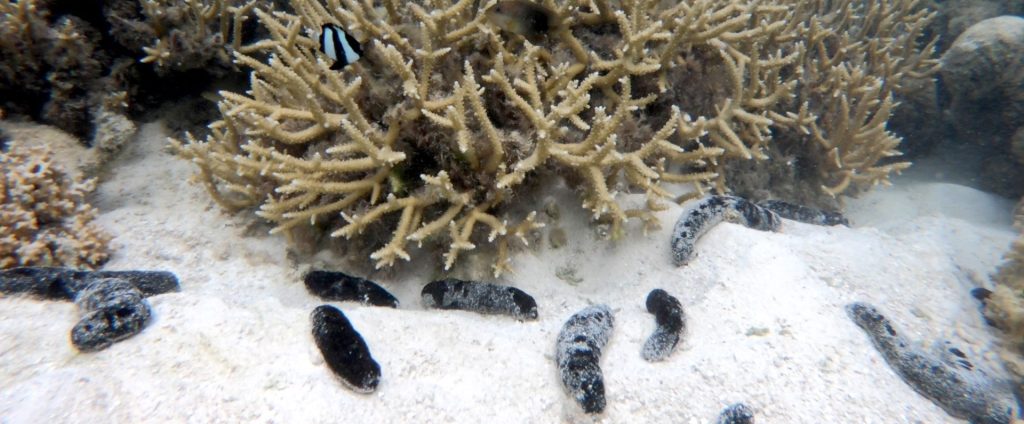Research from French Polynesia and TNC’s Palmyra Atoll Preserve shows that, by feeding on microbial pathogens in marine sediment, the weird and wonderful sea cucumber can enhance reef resilience by suppressing coral diseases.
The Gist
The sea cucumber, a humble bottom-dwelling marine invertebrate famous for both eating and breathing through its butt, hardly seems to fit the role of a protector for anything, much less something as beautiful and intricate as a coral reef.

Still, new science published in Nature Communications, seems to show that’s exactly what they are: protectors. At least when it comes to suppressing coral diseases. Field experiments on reefs at Mo’orea, French Polynesia and TNC’s Palmyra Atoll Preserve found two Acropora species experienced “lower frequencies of disease and greater survivorship when sea cucumbers were present than when they were removed.”
The research at Mo’orea and Palmyra—one a high island with a human population of ~18,000 and one a low-lying atoll with no permanent human presence—found that removing sea cucumbers from the reefs increased the tissue mortality of Acropora pulchra (a species of colonial staghorn coral) by 370% and colony mortality by 1500%.
The Big Picture
Coral diseases play a significant role in the decline of coral reefs around the world. This is especially true for the Acroporid corals, like elkhorn, staghorn and table corals, that represent ~25% of all Pacific coral species and generate much of the topographic complexity—the nooks and crannies, pinnacles, arches, overhangs and walls—that supports reef biodiversity.
Because many of these diseases are associated with pathogens found in the marine sediments where corals touch the sea floor, lowering pathogens in reef-adjacent sediment improves coral survival. Which is where sea cucumbers come in.
“Sea cucumbers,” says the paper’s lead author Cody Clements, a research scientist at the Georgia Institute of Technology, “are the Roombas of the ocean.”
They ingest marine sediment, feed on bacteria, microalgae, and organics within sediment that spread coral disease, and then excrete cleaner sediment. Cleaner sediment means less disease, and less disease means healthier corals that are more resilient to challenges from climate change and other stressors.
Unfortunately, sea cucumbers have been harvested to the extent that they are functionally extinct on many reefs worldwide.
The Takeaway
Historic overharvesting of sea cucumbers increases coral disease and threatens the persistence of tropical reefs. The coral disease outbreaks of the 21st century may have their roots in the 19th.
“The recent blow-up of coral disease may have resulted from a slow burning ecological fuse that humans lit 200 years ago via overharvesting of sea cucumbers, which are critical for cleaning reef sediments, especially in modern times as we continue adding organics and heating the world’s oceans,” notes Mark Hay, Regents’ Professor and the Harry and Anna Teasley Chair in Environmental Biology in the School of Biological Sciences at the Georgia Institute of Technology.
The paper notes that reliable estimates of historic sea cucumber densities are unavailable because they have been collected at large scales for so long. And worldwide harvests continue to increase, from deeper waters and wider ranges. Sea cucumbers are easy to collect, but are extremely slow to recover from harvest. And some populations never recover. To reproduce efficiently, these invertebrates require relatively high population densities.
Continued research into the sea cucumber’s role in reef health and suppression of sediment-associated pathogens is especially important for Acropora species that commonly spread through fragmentation and can form thickets on areas of sediment. They need cleaner sediments for a healthy start, and the best chance of survival.
“During covid,” notes Hay, “we learned of the critical importance of essential workers like janitors that help keep our world clean and healthy. Sea cucumbers are the janitors of the ocean, but we removed them and so should not be surprised to find that our oceans are now more dirty and less healthy.”
The authors conclude that “restoring the essential cleaning services that these detritivores provide may be especially critical to modern oceans due to ocean warming and organic enrichment–both of which enhance microbial growth, metabolism, and pathogenicity.”
“This research highlights the crucial role of often-overlooked species, like the humble sea cucumber, in enhancing reef resilience, and it underscores the need for more holistic approaches to effectively conserve and restore our planet’s imperiled coral reefs,” says Joe Pollock, Senior Reef Strategy Lead with The Nature Conservancy.
Palmyra is a TNC preserve within a US Fish and Wildlife Service National Wildlife Refuge and further protected—out to 50 nautical miles—by the Pacific Remote Islands Marine National Monument, the largest swath of ocean and islands protected under a single jurisdiction in the world. Palmyra Atoll is of global significance for ocean, small island and coral reef research—especially in the face of climate change. It is one of the only marine environments that is spectacularly intact and offers TNC’s research facilities to enable discoveries with application far beyond Palmyra.
References:
Jeckle, W.B., et al. (2013) The anus as a second mouth: anal suspension feeding by an oral deposit-feeding sea cucumber. Invertebrate Biology. https://onlinelibrary.wiley.com/doi/10.1111/ivb.12009



